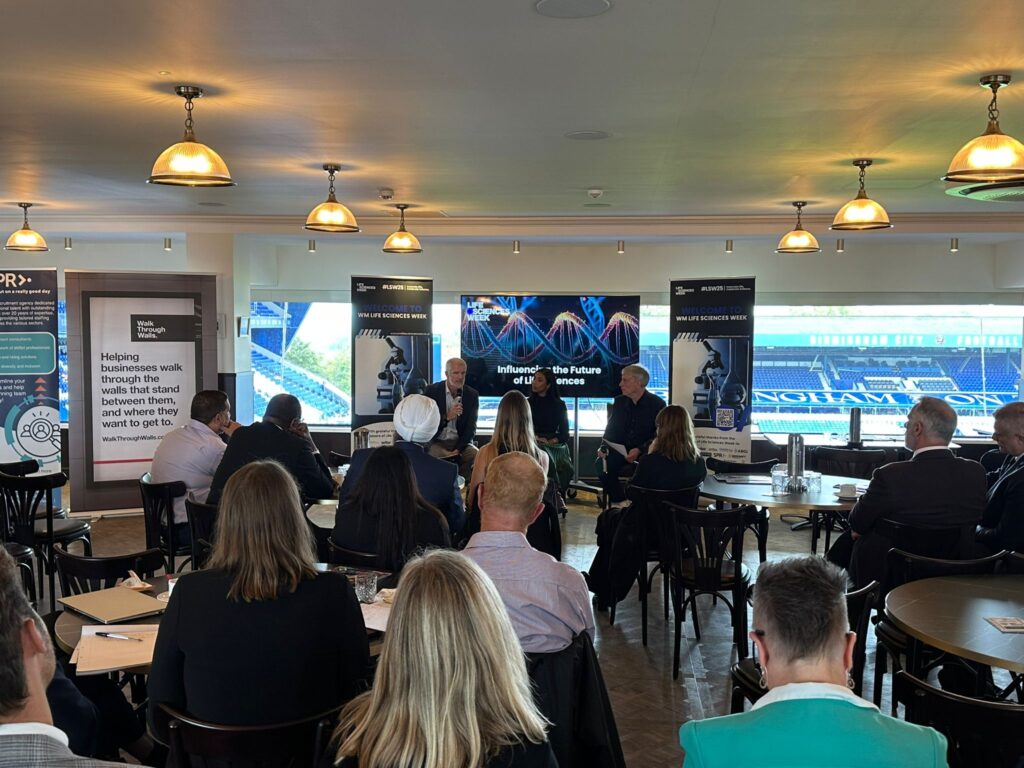Yesterday UK AI Co-Founder Executive Chair Ben Howlett attended West Midlands Life Science Week, where he heard from and Labour MP Al Carns about how cuts to public infrastructure have hindered social mobility, the unique opportunities the West Midlands’ demographics can provide the life science sector, and the region’s difficulty attracting investment.
Carns began the interview by discussing social mobility, comparing people to flowers, saying that individuals will struggle to develop, or ‘wilt,’ if they are not in the right environment.
He highlighted that Birmingham is a city of major inequality, with areas of severe deprivation existing alongside ones of great affluence, and said that life outcomes in the city effectively come down to a ‘postcode lottery.’
Social mobility is a topic particularly close to Carns’ heart; he comes from humble beginnings, being raised as one of five children in a small house in Aberdeen, before joining the military at a young age, which provided him with an opportunity to climb the socioeconomic ladder, but he is worried that now there are far less opportunities for young people to do the same.
Along with the military, Carns referenced sport as an excellent mechanism for social mobility, however he believes that there is now far less opportunity for people in Birmingham to access sporting facilities as there once was. The city’s council is in dire financial straits, and has thus had to make major cuts, with one victim being youth centres, with there only being 3 left in Birmingham, compared to 16 in 2010.
Carns also worries how such closures will impact the health of his constituents, citing a recent Aston University study that showed a correlation between a lack of access to sporting facilities and negative health outcomes.
In order to resolve these disparities, Carns called on councils, football clubs, universities and other institutions to collaborate, however recognised that some obstacles currently exist that may hinder efforts to provide everyone in Birmingham the opportunity for social mobility.
According to Carns, one such potential obstacle is Birmingham’s diversity. He argued that steps to tackle wealth inequality need to be driven by data, but some of Birmingham’s communities don’t participate in data collection efforts. This poses an issue, as according to Carns ‘the more accurate analysis…more effective services we can put in place.’
However, he recognised that the West Midlands’ diversity could also create unique opportunities. He claimed that the region’s demographics make it a ‘microcosm of the world,’ thus making it an excellent location to pilot health and social care initiatives before rolling them out to the rest of the country, and that its young population, the youngest in the UK, would make it an excellent place to trial and fund preventative healthcare programmes, at a time when the government and NHS aim to focus more on prevention than treatment.

But despite its potential, the West Midlands currently lags behind London, Cambridge, and Oxford when it comes to life sciences investment, something that Carns hopes to rectify.
He said that whilst the region has plenty innovative start-ups, they are struggling scale-up due to a lack of investment. He expressed frustration that investors prefer to invest in the south, looking for bigger returns and ignoring the impact their choices could have on local communities.
One way Carns believes this issue could be solved is by improving the region’s branding, by initiating some form of marketing campaign to give the West Midland’s its own regional identity and a USP.
Later on in the day, Ben took part in a panel discussion with several leading professionals in the regions life science sector, covering topics such as cyber security AI, and intellectual property, and their relevance to the life sciences sector.
One particularly relevant topic that was touched upon was the recent cyberattack on Jaguar Land Rover. The attack has hit the West Midlands especially hard, with the company having a car plant in Solihull, an engine facility in Wolverhampton, and an engineering centre in Gaydon, near Warwick.
Charlie Blakemore, CEO of IT consulting firm Intercity, described the attack as ‘absolutely crippling, and said that boards of companies must carry out metaphorical ‘fire drills’ to prepare for cyberattacks, or risk being held responsible if such events occur. He added that staying on top of cybersecurity was now easier for firms, as most business insurance plans will include some kind of cyber-consultancy to assist them.
The conversation then shifted on to AI, and its potential risks and benefits. Radiologist and University of Birmingham research fellow Aditya Kale spoke highly of the opportunities artificial intelligence can provide the life science industry, particularly when it comes to the development of drugs and medical procedures.
He cited a new programme being used in the West Midlands, in which a technology known as DERM (Deep Ensemble for Recognition of Malignancy) processes images of irregular skin legions to determine whether they are cancerous, allowing GPs and hospitals to cut significant time in the skin cancer triage process.
But Kale caveated this by noting that performance of such technology is often reported as an overall metric without considering subgroups such as age, sex, or ethnicity, and thus more needs to be done to monitor the extent to which AI is impacting individual demographics.
Another risk of AI’s use in the medicine industry was highlighted by Patrick McCallum, a lawyer and associate at VWV. He warned that some patients may be unhappy at the idea of their personal and health data being used by large language models to develop new AI-powered drugs and procedures and said that clauses allowing for this may have to be added to data protection agreements.
He also raised an issue related to Intellectual Property, highlighting that if you use AI to develop a medicine or process, you cannot be certain that the final product is legally yours. Therefore, he stressed the importance of looking at IP clauses ‘really closely,’ in order to avoid an infringement claim.
Overall, the two discussions highlighted that the West Midlands’ life science sector faces a complex mix of challenges and opportunities.
The region’s unique demographics make it an ideal testing ground for preventative health initiatives, while a vibrant start-up ecosystem and the adoption of innovative AI-driven medical technologies demonstrate its potential to become a leader in the UK’s life sciences sector.
At the same time, cyberattacks present a serious threat, a lack of regional identity limits investment, and persistent wealth inequality jeopardizes the health and wellbeing of residents in the most deprived areas.
As Alan Carns emphasized, realizing the region’s full potential will require collaboration across communities, institutions, and industry to develop and execute a coherent strategy for growth, innovation, and equity.

